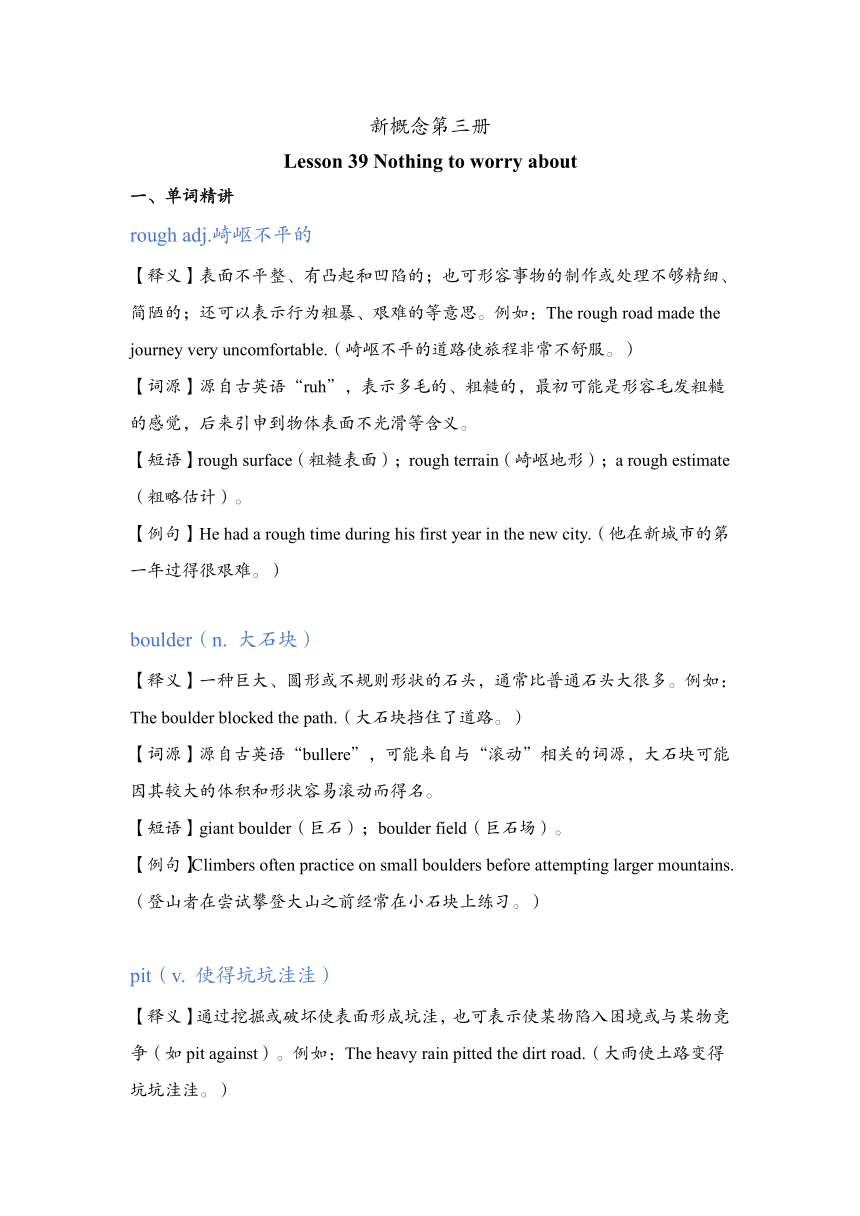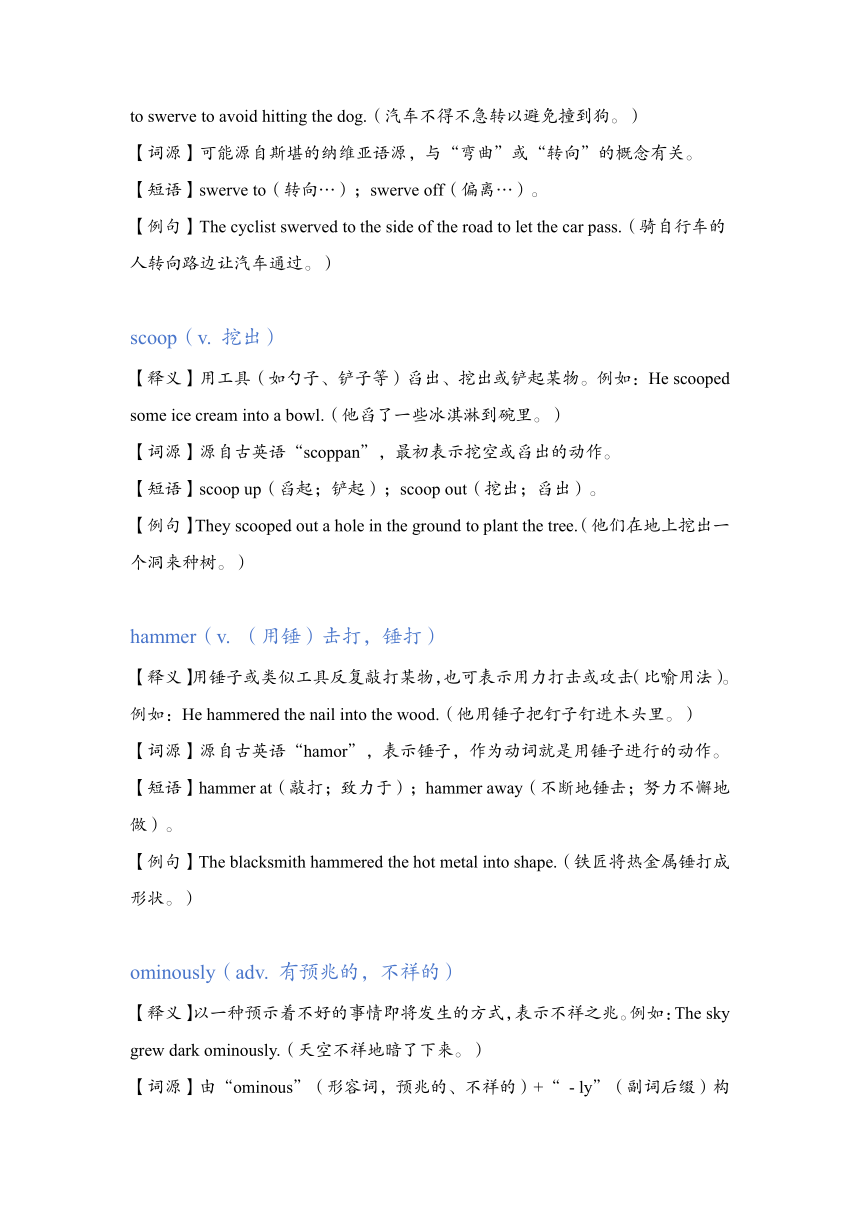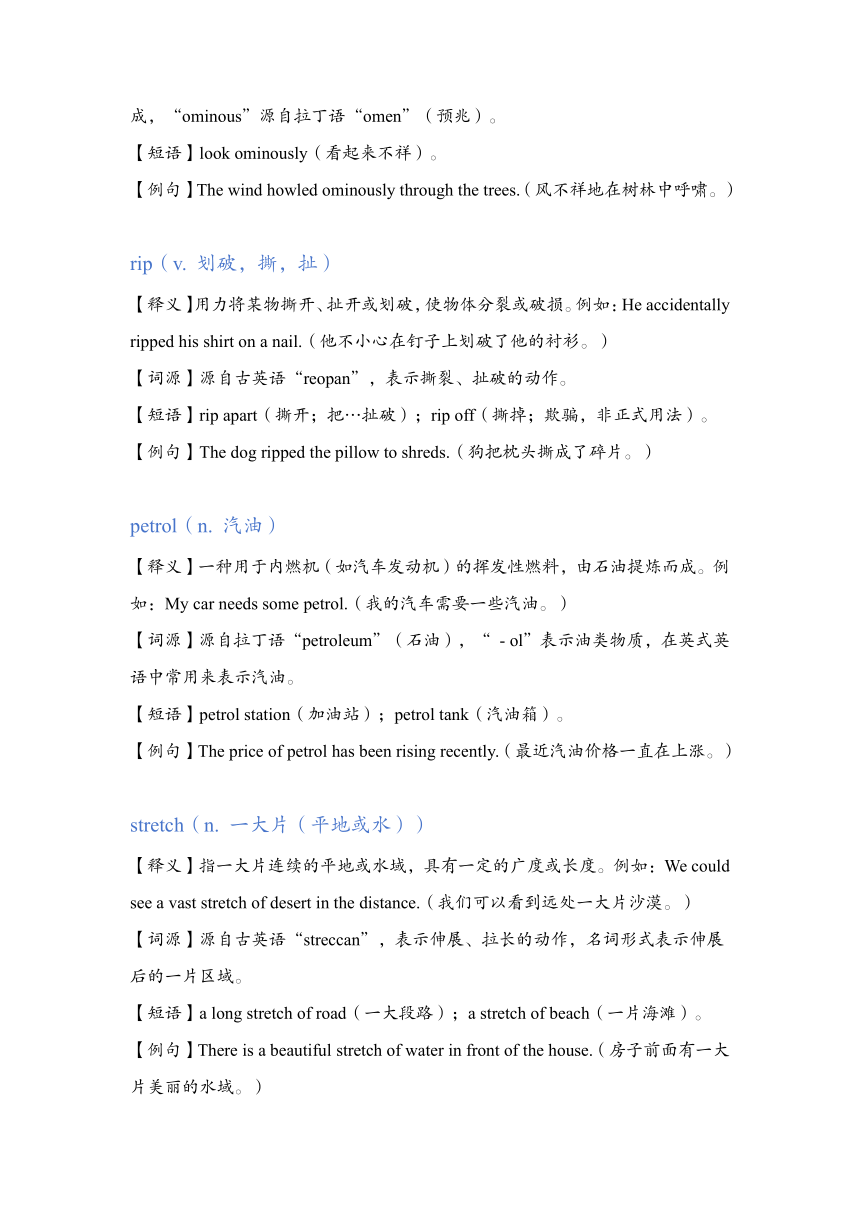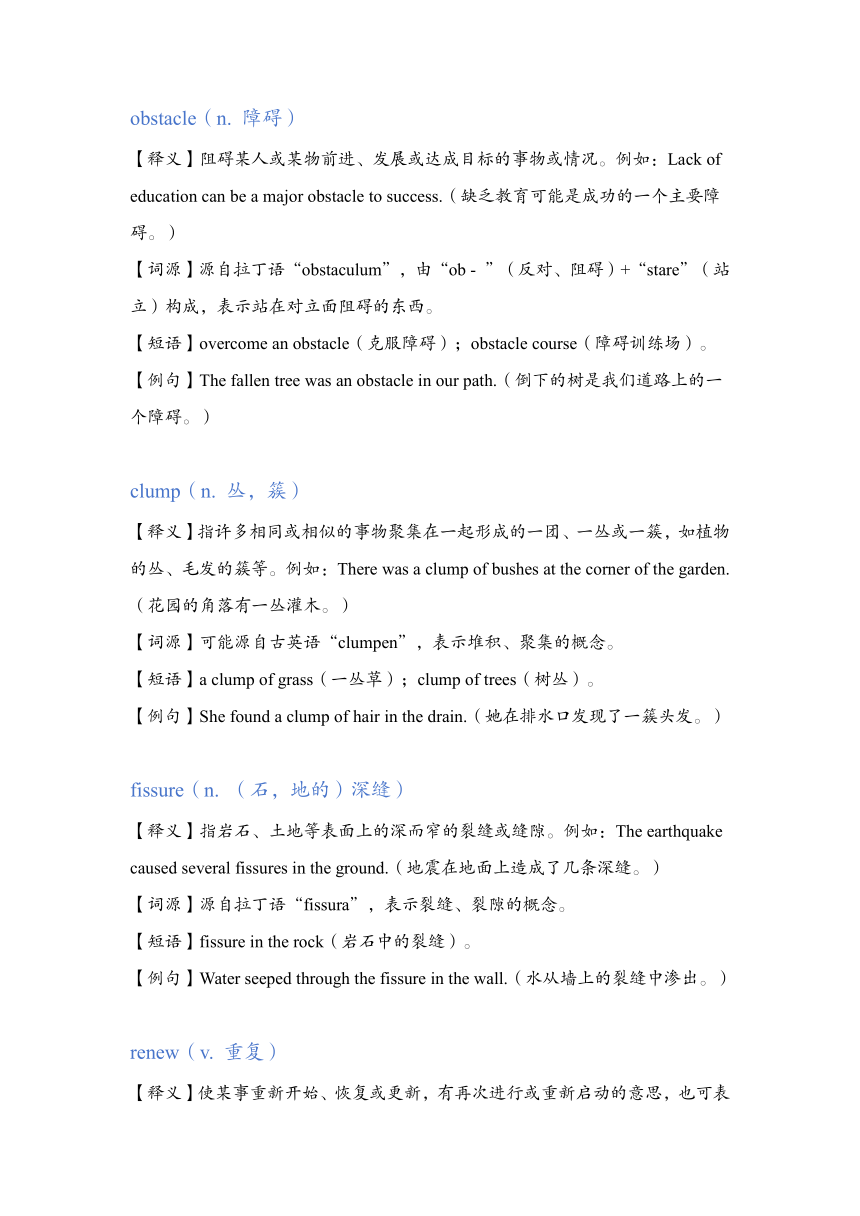新概念第三册Lesson 39 Nothing to worry about讲义
文档属性
| 名称 | 新概念第三册Lesson 39 Nothing to worry about讲义 |

|
|
| 格式 | docx | ||
| 文件大小 | 402.2KB | ||
| 资源类型 | 教案 | ||
| 版本资源 | 新概念英语 | ||
| 科目 | 英语 | ||
| 更新时间 | 2024-12-05 09:59:29 | ||
图片预览





文档简介
新概念第三册
Lesson 39 Nothing to worry about
单词精讲
rough adj.崎岖不平的
【释义】表面不平整、有凸起和凹陷的;也可形容事物的制作或处理不够精细、简陋的;还可以表示行为粗暴、艰难的等意思。例如:The rough road made the journey very uncomfortable.(崎岖不平的道路使旅程非常不舒服。)
【词源】源自古英语“ruh”,表示多毛的、粗糙的,最初可能是形容毛发粗糙的感觉,后来引申到物体表面不光滑等含义。
【短语】rough surface(粗糙表面);rough terrain(崎岖地形);a rough estimate(粗略估计)。
【例句】He had a rough time during his first year in the new city.(他在新城市的第一年过得很艰难。)
boulder(n. 大石块)
【释义】一种巨大、圆形或不规则形状的石头,通常比普通石头大很多。例如:The boulder blocked the path.(大石块挡住了道路。)
【词源】源自古英语“bullere”,可能来自与“滚动”相关的词源,大石块可能因其较大的体积和形状容易滚动而得名。
【短语】giant boulder(巨石);boulder field(巨石场)。
【例句】Climbers often practice on small boulders before attempting larger mountains.(登山者在尝试攀登大山之前经常在小石块上练习。)
pit(v. 使得坑坑洼洼)
【释义】通过挖掘或破坏使表面形成坑洼,也可表示使某物陷入困境或与某物竞争(如pit against)。例如:The heavy rain pitted the dirt road.(大雨使土路变得坑坑洼洼。)
【词源】源自古英语“pytt”,最初表示一个小的凹陷或洞,作为动词时表示制造这种凹陷。
【短语】pit against(使与…对抗);be pitted with(布满…坑洼)。
【例句】The surface of the old table was pitted with scratches.(旧桌子的表面布满了划痕形成的坑洼。)
perturb(v. 使不安)
【释义】使(某人或某物)心烦意乱、扰乱,通常是因为发生了意外或不愉快的事情。例如:The news of the accident perturbed him greatly.(事故的消息使他非常不安。)
【词源】源自拉丁语“perturbare”,由“per - ”(彻底地)+“turbare”(扰乱)构成,意思是彻底地扰乱。
【短语】be perturbed by(被…所扰乱)。
【例句】She was perturbed by the strange noises outside.(她被外面奇怪的声音弄得不安。)
underestimate(v. 低估)
【释义】对某人或某物的能力、价值、数量等估计过低。例如:Don't underestimate his intelligence.(不要低估他的智力。)
【词源】由“under - ”(在…之下、低于)+“estimate”(估计)构成,表示低于实际的估计。
【短语】underestimate the importance(低估重要性);underestimate one's strength(低估某人的力量)。
【例句】They underestimated the cost of the project.(他们低估了项目的成本。)
swerve(v. 急转变)
【释义】突然改变方向,尤指车辆或其他移动物体突然转向。例如:The car had to swerve to avoid hitting the dog.(汽车不得不急转以避免撞到狗。)
【词源】可能源自斯堪的纳维亚语源,与“弯曲”或“转向”的概念有关。
【短语】swerve to(转向…);swerve off(偏离…)。
【例句】The cyclist swerved to the side of the road to let the car pass.(骑自行车的人转向路边让汽车通过。)
scoop(v. 挖出)
【释义】用工具(如勺子、铲子等)舀出、挖出或铲起某物。例如:He scooped some ice cream into a bowl.(他舀了一些冰淇淋到碗里。)
【词源】源自古英语“scoppan”,最初表示挖空或舀出的动作。
【短语】scoop up(舀起;铲起);scoop out(挖出;舀出)。
【例句】They scooped out a hole in the ground to plant the tree.(他们在地上挖出一个洞来种树。)
hammer(v. (用锤)击打,锤打)
【释义】用锤子或类似工具反复敲打某物,也可表示用力打击或攻击(比喻用法)。例如:He hammered the nail into the wood.(他用锤子把钉子钉进木头里。)
【词源】源自古英语“hamor”,表示锤子,作为动词就是用锤子进行的动作。
【短语】hammer at(敲打;致力于);hammer away(不断地锤击;努力不懈地做)。
【例句】The blacksmith hammered the hot metal into shape.(铁匠将热金属锤打成形状。)
ominously(adv. 有预兆的,不祥的)
【释义】以一种预示着不好的事情即将发生的方式,表示不祥之兆。例如:The sky grew dark ominously.(天空不祥地暗了下来。)
【词源】由“ominous”(形容词,预兆的、不祥的)+“ - ly”(副词后缀)构成,“ominous”源自拉丁语“omen”(预兆)。
【短语】look ominously(看起来不祥)。
【例句】The wind howled ominously through the trees.(风不祥地在树林中呼啸。)
rip(v. 划破,撕,扯)
【释义】用力将某物撕开、扯开或划破,使物体分裂或破损。例如:He accidentally ripped his shirt on a nail.(他不小心在钉子上划破了他的衬衫。)
【词源】源自古英语“reopan”,表示撕裂、扯破的动作。
【短语】rip apart(撕开;把…扯破);rip off(撕掉;欺骗,非正式用法)。
【例句】The dog ripped the pillow to shreds.(狗把枕头撕成了碎片。)
petrol(n. 汽油)
【释义】一种用于内燃机(如汽车发动机)的挥发性燃料,由石油提炼而成。例如:My car needs some petrol.(我的汽车需要一些汽油。)
【词源】源自拉丁语“petroleum”(石油),“ - ol”表示油类物质,在英式英语中常用来表示汽油。
【短语】petrol station(加油站);petrol tank(汽油箱)。
【例句】The price of petrol has been rising recently.(最近汽油价格一直在上涨。)
stretch(n. 一大片(平地或水))
【释义】指一大片连续的平地或水域,具有一定的广度或长度。例如:We could see a vast stretch of desert in the distance.(我们可以看到远处一大片沙漠。)
【词源】源自古英语“streccan”,表示伸展、拉长的动作,名词形式表示伸展后的一片区域。
【短语】a long stretch of road(一大段路);a stretch of beach(一片海滩)。
【例句】There is a beautiful stretch of water in front of the house.(房子前面有一大片美丽的水域。)
obstacle(n. 障碍)
【释义】阻碍某人或某物前进、发展或达成目标的事物或情况。例如:Lack of education can be a major obstacle to success.(缺乏教育可能是成功的一个主要障碍。)
【词源】源自拉丁语“obstaculum”,由“ob - ”(反对、阻碍)+“stare”(站立)构成,表示站在对立面阻碍的东西。
【短语】overcome an obstacle(克服障碍);obstacle course(障碍训练场)。
【例句】The fallen tree was an obstacle in our path.(倒下的树是我们道路上的一个障碍。)
clump(n. 丛,簇)
【释义】指许多相同或相似的事物聚集在一起形成的一团、一丛或一簇,如植物的丛、毛发的簇等。例如:There was a clump of bushes at the corner of the garden.(花园的角落有一丛灌木。)
【词源】可能源自古英语“clumpen”,表示堆积、聚集的概念。
【短语】a clump of grass(一丛草);clump of trees(树丛)。
【例句】She found a clump of hair in the drain.(她在排水口发现了一簇头发。)
fissure(n. (石,地的)深缝)
【释义】指岩石、土地等表面上的深而窄的裂缝或缝隙。例如:The earthquake caused several fissures in the ground.(地震在地面上造成了几条深缝。)
【词源】源自拉丁语“fissura”,表示裂缝、裂隙的概念。
【短语】fissure in the rock(岩石中的裂缝)。
【例句】Water seeped through the fissure in the wall.(水从墙上的裂缝中渗出。)
renew(v. 重复)
【释义】使某事重新开始、恢复或更新,有再次进行或重新启动的意思,也可表示延长(如合同、许可证等的有效期)。例如:They decided to renew their friendship after years of separation.(他们在多年分离后决定重续友谊。)
【词源】由“re - ”(再、重新)+“new”(新的)构成,表示重新变得新的,即更新、重新开始。
【短语】renew a contract(续签合同);renew one's efforts(重新努力)。
【例句】We need to renew our library cards every year.(我们需要每年更新我们的图书馆借书卡。)
pleading(n. 恳求)
【释义】一种真诚、急切地请求或哀求的行为或表达。例如:His pleading for help was ignored.(他的恳求帮助被忽视了。)
【词源】由“plead”(动词,恳求)+“ - ing”(名词后缀)构成,“plead”源自古英语“pledian”。
【短语】a pleading look(恳求的眼神)。
【例句】The child's pleading made his mother change her mind.(孩子的恳求使他的母亲改变了主意。)
gear(n. 汽车排档)
【释义】汽车或其他机械装置中的排档,用于控制速度和动力传输。例如:Put the car in gear and start driving.(把汽车挂上档然后开始驾驶。)
【词源】源自古英语“gēr”,表示装备、器具,在汽车领域指用于变速的排档装置。
【短语】shift gears(换挡);high - gear(高档位);low - gear(低档位)。
【例句】The mechanic checked the gears of the car.(机械师检查了汽车的排档。)
astride(prep. 骑,跨)
【释义】表示跨在某物上,两腿分开放在两边的姿势。例如:The boy sat astride the horse.(男孩骑在马上。)
【词源】由“a - ”(在…之上)+“stride”(大步走、跨步)构成,表示跨在上面的姿势。
【短语】sit astride(跨坐)。
【例句】He stood astride the log.(他跨站在原木上。)
crack(n. 缝隙)
【释义】物体表面上的窄缝或裂口,通常是由于压力、撞击或老化等原因造成的。例如:There is a crack in the wall.(墙上有一条缝隙。)
【词源】源自古英语“cracian”,表示发出破裂声,名词形式表示破裂后形成的缝隙。
【短语】a hair - line crack(发丝般的裂缝);crack in the ice(冰上的裂缝)。
【例句】The glass has a crack in it.(玻璃上有一条裂缝。)
zigzag(n. “之”字形)
【释义】一种呈连续的之字形的形状或线条,有许多短的、交替方向的转折。例如:The path followed a zigzag course up the hill.(小路呈之字形蜿蜒上山。)
【词源】可能是模仿之字形的形状而创造的词,由两个相似的部分“zig”和“zag”组成。
【短语】zigzag pattern(之字形图案);zigzag line(之字线)。
【例句】The lightning bolt had a zigzag shape.(闪电有一个之字形的形状。)
shallow(adj. 浅的)
【释义】形容深度较浅的,可用于描述水、容器、思想等方面缺乏深度的情况。例如:The shallow water was warm.(浅水是温暖的。)
【词源】源自古英语“sceald”,表示浅的,与深度相关的概念。
【短语】shallow pool(浅水池);shallow understanding(肤浅的理解)。
【例句】His shallow knowledge of the subject was obvious.(他对这个学科肤浅的知识是显而易见的。)
grind (ground, ground) v. 磨擦
【释义】通过摩擦使物体表面磨损、粉碎或变平滑;也可表示艰难地移动或持续努力地做某事(如grind away)。例如:The miller grinds wheat into flour.(磨坊主把小麦磨成面粉。)
【词源】源自古英语“grindan”,表示研磨、摩擦的动作。
【短语】grind to a halt(慢慢停下来);grind out(费力地做出;生拼硬凑地写出)。
【例句】The gears grind when the car is in reverse.(汽车倒车时齿轮会摩擦。)
halt(n. 停)
【释义】表示停止、停顿的状态或动作。例如:The train came to a sudden halt.(火车突然停了下来。)
【词源】
源自古英语“healdan”,表示持有、保持,在这里表示保持停止的状态。
【短语】come to a halt(停止);bring to a halt(使停止)。
【例句】The traffic came to a halt because of the accident.(由于事故,交通停止了。)
dashboard(n. (汽车上的)仪表盘)
【释义】汽车驾驶室内位于驾驶员前方的面板,上面有各种仪表、指示灯等,用于显示车辆的运行状态和相关信息。例如:The speedometer on the dashboard showed that he was driving too fast.(仪表盘上的速度表显示他开得太快了。)
【词源】“dash”表示猛冲、冲击,“board”表示板,最初可能是指防止泥水等溅到驾驶员身上的一块板,后来演变成了带有各种仪表的仪表盘。
【短语】dashboard lights(仪表盘灯);clean the dashboard(清洁仪表盘)。
【例句】She noticed a warning light on the dashboard.(她注意到仪表盘上有一个警示灯。)
二、课文精讲
1.The rough road across the plain soon became so bad that we tried to get Bruce to drive back to the village we had come from.
穿越平原的道路高低不平,开车走了不远,路面愈加崎岖。我们想劝说布鲁斯把车开回我们出发的那个村庄去。
so…that…引导结果状语从句,so bad说明原因是“路太崎岖”,that引出结果“劝他返回”。
Even though the road was littered with boulders and pitted with holes, Bruce was not in the least perturbed.
尽管路面布满石头,坑坑洼洼,但布鲁斯却一点儿不慌乱。
even though引导让步状语从句,往往先提出一个不利条件,而后经常会出现转机。
Glancing at his map, he informed us that the next village was a mere twenty miles away.
他瞥了一眼地图,告诉我们前面再走不到20英里就是一个村庄。
现在分词短语glancing at his map作时间状语。That引导宾语从句,交代infrom的内容。
It was not that Bruce always underestimated difficulties.
这并不是说布鲁斯总是低估困难。
that引导表语从句。
underestimated difficulty的意思是“低估困难”。
He simply had no sense of danger at all.
而是他压根儿没有一点儿危险感。
simply和at all起强调作用。
have no sense of…的意思是“没有…的感觉”。
No matter what the conditions were, he believed that a car should be driven as fast as it could possibly go.
他认为不管路面情况如何,车必须以最高速度前进。
that引导宾语从句,交代believed的内容。
as fast as it could possibly go的意思是“以最快的速度向前”。
As we bumped over the dusty track, we swerved to avoid large boulders.
我们在尘士飞扬的道路上颠簸,车子东拐西弯,以躲开那些大圆石。
as在此不是引导原因状语从句,而是引导时间状语从句,可以解释为“一边…一边…”。to avoid large boulders为动词不定式短语,作目的状语。
8.The wheels scooped up stones which hammered ominously under the car.车轮搅起的石块锤击车身,发出不祥的锤击声。
which引导定语从句,修饰stones。
scoope up的意思是“铲起,卷起”。
We felt sure that sooner or later a stone would rip a hole in our petrol tank or damage the engine.
我们想念迟早会飞起一个石块把油箱砸开一个窟窿,或者把发动机砸坏。
that引导宾语从句,交代felt sure的内容。
rip的本意是“撕开”,在此引申为“砸开”。
Because of this, we kept looking back, wondering if we were leaving a trail of oil and petrol behind us.
因此,我们不时地掉过头,怀疑车后是否留下了机油和汽油的痕迹。
wondering if…是现在分词结构,作伴随状语,其中的if引导宾语从句,说明wondering的内容。
keep looking back的意思是“不断地向后看”。
What a relief it was when the boulders suddenly disappeared, giving way to a stretch of plain where the only obstacles were clumps of bushes.
突然大石块不见了,前面是一片平地,唯一的障碍只有一簇簇灌木丛。这使我们长长地松了口气。
give way to的意思是“给…让路”。
12.But there was worse to come.但是更糟糕的事情在等着我们。
worse指代“更糟糕的事情”。To come为动词不定式结构,充当worse的后置定语。
13.Just ahead of us there was a huge fissure.离我们不远处,出现一个大裂缝。
just ahead of us充当地点状语。
In response to renewed pleadings, Bruce stopped.
我们再次央求布鲁斯小心,他这才把车停了下来。
in response to renewed pleadings作原因状语,说明“由于…才停车”。
Though we all got out to examine the fissure, he remained in the car.
我们纷纷下车察看那个大裂缝,他却呆在车上。
though引导让步状语从句,说明“他对此事的态度”。
We informed him that the fissure extended for fifty yards and was two feet wide and four feet deep.
我们告诉他那个大裂缝长50码,宽2英尺,深4英尺。
that引导宾语从句,是直接宾语,交代informed的内容,him是间接宾语。
17.Even this had no effect.这也没有对他产生任何影响。
this指代上句所说的大裂缝的情况。
Bruce went into a low gear and drove at a terrifying speed, keeping the front wheels astride the crack as he followed its zig-zag course.
布鲁斯挂上慢档,把两只前轮分别搁在裂缝的两边,顺着弯弯曲曲的裂缝,以发疯的速度向前开去。
go into gear的意思是“挂档”。现在分词短语keeping…作伴随状语。As引导时间状语从句。
19.Before we had time to worry about what might happen, we were back on the plain again. 我们还未来得及担心后果,车已重新开上了平地。
before引导时间状语从句,从句中还包含一个宾语从句what might happen,交代worry的内容。
Bruce consulted the map once more and told us that the village was now only fifteen miles away.
布鲁斯又看了一眼地图,告诉我们那座村庄离我们只有15英里了。
that引导宾语从句,说明told的内容。
Our next obstacle was a shallow pool of water about half a mile across.
下一个障碍是一片约半英里宽的浅水塘。
about half a mile across为介词短语,作后置定语,说明浅水塘的情况。
Bruce charged at it, but in the middle, the car came to a grinding halt.
布鲁斯向水塘冲去,但车开到水塘当中,嘎吱一声停住了。
but in the middle作插入语。
A yellow light on the dash- board flashed angrily and Bruce cheerfully announced that there was no oil in the engine!
仪表盘一盏黄灯闪着刺眼的光芒,布鲁斯兴致勃勃地宣布发动机里没油了!
angrily本意是“生气地”,在此不可译作“仪表盘生气地闪着灯”,而应引申为“刺眼地闪烁着”。That引导宾语从句,交代announced的内容。
Lesson 39 Nothing to worry about
单词精讲
rough adj.崎岖不平的
【释义】表面不平整、有凸起和凹陷的;也可形容事物的制作或处理不够精细、简陋的;还可以表示行为粗暴、艰难的等意思。例如:The rough road made the journey very uncomfortable.(崎岖不平的道路使旅程非常不舒服。)
【词源】源自古英语“ruh”,表示多毛的、粗糙的,最初可能是形容毛发粗糙的感觉,后来引申到物体表面不光滑等含义。
【短语】rough surface(粗糙表面);rough terrain(崎岖地形);a rough estimate(粗略估计)。
【例句】He had a rough time during his first year in the new city.(他在新城市的第一年过得很艰难。)
boulder(n. 大石块)
【释义】一种巨大、圆形或不规则形状的石头,通常比普通石头大很多。例如:The boulder blocked the path.(大石块挡住了道路。)
【词源】源自古英语“bullere”,可能来自与“滚动”相关的词源,大石块可能因其较大的体积和形状容易滚动而得名。
【短语】giant boulder(巨石);boulder field(巨石场)。
【例句】Climbers often practice on small boulders before attempting larger mountains.(登山者在尝试攀登大山之前经常在小石块上练习。)
pit(v. 使得坑坑洼洼)
【释义】通过挖掘或破坏使表面形成坑洼,也可表示使某物陷入困境或与某物竞争(如pit against)。例如:The heavy rain pitted the dirt road.(大雨使土路变得坑坑洼洼。)
【词源】源自古英语“pytt”,最初表示一个小的凹陷或洞,作为动词时表示制造这种凹陷。
【短语】pit against(使与…对抗);be pitted with(布满…坑洼)。
【例句】The surface of the old table was pitted with scratches.(旧桌子的表面布满了划痕形成的坑洼。)
perturb(v. 使不安)
【释义】使(某人或某物)心烦意乱、扰乱,通常是因为发生了意外或不愉快的事情。例如:The news of the accident perturbed him greatly.(事故的消息使他非常不安。)
【词源】源自拉丁语“perturbare”,由“per - ”(彻底地)+“turbare”(扰乱)构成,意思是彻底地扰乱。
【短语】be perturbed by(被…所扰乱)。
【例句】She was perturbed by the strange noises outside.(她被外面奇怪的声音弄得不安。)
underestimate(v. 低估)
【释义】对某人或某物的能力、价值、数量等估计过低。例如:Don't underestimate his intelligence.(不要低估他的智力。)
【词源】由“under - ”(在…之下、低于)+“estimate”(估计)构成,表示低于实际的估计。
【短语】underestimate the importance(低估重要性);underestimate one's strength(低估某人的力量)。
【例句】They underestimated the cost of the project.(他们低估了项目的成本。)
swerve(v. 急转变)
【释义】突然改变方向,尤指车辆或其他移动物体突然转向。例如:The car had to swerve to avoid hitting the dog.(汽车不得不急转以避免撞到狗。)
【词源】可能源自斯堪的纳维亚语源,与“弯曲”或“转向”的概念有关。
【短语】swerve to(转向…);swerve off(偏离…)。
【例句】The cyclist swerved to the side of the road to let the car pass.(骑自行车的人转向路边让汽车通过。)
scoop(v. 挖出)
【释义】用工具(如勺子、铲子等)舀出、挖出或铲起某物。例如:He scooped some ice cream into a bowl.(他舀了一些冰淇淋到碗里。)
【词源】源自古英语“scoppan”,最初表示挖空或舀出的动作。
【短语】scoop up(舀起;铲起);scoop out(挖出;舀出)。
【例句】They scooped out a hole in the ground to plant the tree.(他们在地上挖出一个洞来种树。)
hammer(v. (用锤)击打,锤打)
【释义】用锤子或类似工具反复敲打某物,也可表示用力打击或攻击(比喻用法)。例如:He hammered the nail into the wood.(他用锤子把钉子钉进木头里。)
【词源】源自古英语“hamor”,表示锤子,作为动词就是用锤子进行的动作。
【短语】hammer at(敲打;致力于);hammer away(不断地锤击;努力不懈地做)。
【例句】The blacksmith hammered the hot metal into shape.(铁匠将热金属锤打成形状。)
ominously(adv. 有预兆的,不祥的)
【释义】以一种预示着不好的事情即将发生的方式,表示不祥之兆。例如:The sky grew dark ominously.(天空不祥地暗了下来。)
【词源】由“ominous”(形容词,预兆的、不祥的)+“ - ly”(副词后缀)构成,“ominous”源自拉丁语“omen”(预兆)。
【短语】look ominously(看起来不祥)。
【例句】The wind howled ominously through the trees.(风不祥地在树林中呼啸。)
rip(v. 划破,撕,扯)
【释义】用力将某物撕开、扯开或划破,使物体分裂或破损。例如:He accidentally ripped his shirt on a nail.(他不小心在钉子上划破了他的衬衫。)
【词源】源自古英语“reopan”,表示撕裂、扯破的动作。
【短语】rip apart(撕开;把…扯破);rip off(撕掉;欺骗,非正式用法)。
【例句】The dog ripped the pillow to shreds.(狗把枕头撕成了碎片。)
petrol(n. 汽油)
【释义】一种用于内燃机(如汽车发动机)的挥发性燃料,由石油提炼而成。例如:My car needs some petrol.(我的汽车需要一些汽油。)
【词源】源自拉丁语“petroleum”(石油),“ - ol”表示油类物质,在英式英语中常用来表示汽油。
【短语】petrol station(加油站);petrol tank(汽油箱)。
【例句】The price of petrol has been rising recently.(最近汽油价格一直在上涨。)
stretch(n. 一大片(平地或水))
【释义】指一大片连续的平地或水域,具有一定的广度或长度。例如:We could see a vast stretch of desert in the distance.(我们可以看到远处一大片沙漠。)
【词源】源自古英语“streccan”,表示伸展、拉长的动作,名词形式表示伸展后的一片区域。
【短语】a long stretch of road(一大段路);a stretch of beach(一片海滩)。
【例句】There is a beautiful stretch of water in front of the house.(房子前面有一大片美丽的水域。)
obstacle(n. 障碍)
【释义】阻碍某人或某物前进、发展或达成目标的事物或情况。例如:Lack of education can be a major obstacle to success.(缺乏教育可能是成功的一个主要障碍。)
【词源】源自拉丁语“obstaculum”,由“ob - ”(反对、阻碍)+“stare”(站立)构成,表示站在对立面阻碍的东西。
【短语】overcome an obstacle(克服障碍);obstacle course(障碍训练场)。
【例句】The fallen tree was an obstacle in our path.(倒下的树是我们道路上的一个障碍。)
clump(n. 丛,簇)
【释义】指许多相同或相似的事物聚集在一起形成的一团、一丛或一簇,如植物的丛、毛发的簇等。例如:There was a clump of bushes at the corner of the garden.(花园的角落有一丛灌木。)
【词源】可能源自古英语“clumpen”,表示堆积、聚集的概念。
【短语】a clump of grass(一丛草);clump of trees(树丛)。
【例句】She found a clump of hair in the drain.(她在排水口发现了一簇头发。)
fissure(n. (石,地的)深缝)
【释义】指岩石、土地等表面上的深而窄的裂缝或缝隙。例如:The earthquake caused several fissures in the ground.(地震在地面上造成了几条深缝。)
【词源】源自拉丁语“fissura”,表示裂缝、裂隙的概念。
【短语】fissure in the rock(岩石中的裂缝)。
【例句】Water seeped through the fissure in the wall.(水从墙上的裂缝中渗出。)
renew(v. 重复)
【释义】使某事重新开始、恢复或更新,有再次进行或重新启动的意思,也可表示延长(如合同、许可证等的有效期)。例如:They decided to renew their friendship after years of separation.(他们在多年分离后决定重续友谊。)
【词源】由“re - ”(再、重新)+“new”(新的)构成,表示重新变得新的,即更新、重新开始。
【短语】renew a contract(续签合同);renew one's efforts(重新努力)。
【例句】We need to renew our library cards every year.(我们需要每年更新我们的图书馆借书卡。)
pleading(n. 恳求)
【释义】一种真诚、急切地请求或哀求的行为或表达。例如:His pleading for help was ignored.(他的恳求帮助被忽视了。)
【词源】由“plead”(动词,恳求)+“ - ing”(名词后缀)构成,“plead”源自古英语“pledian”。
【短语】a pleading look(恳求的眼神)。
【例句】The child's pleading made his mother change her mind.(孩子的恳求使他的母亲改变了主意。)
gear(n. 汽车排档)
【释义】汽车或其他机械装置中的排档,用于控制速度和动力传输。例如:Put the car in gear and start driving.(把汽车挂上档然后开始驾驶。)
【词源】源自古英语“gēr”,表示装备、器具,在汽车领域指用于变速的排档装置。
【短语】shift gears(换挡);high - gear(高档位);low - gear(低档位)。
【例句】The mechanic checked the gears of the car.(机械师检查了汽车的排档。)
astride(prep. 骑,跨)
【释义】表示跨在某物上,两腿分开放在两边的姿势。例如:The boy sat astride the horse.(男孩骑在马上。)
【词源】由“a - ”(在…之上)+“stride”(大步走、跨步)构成,表示跨在上面的姿势。
【短语】sit astride(跨坐)。
【例句】He stood astride the log.(他跨站在原木上。)
crack(n. 缝隙)
【释义】物体表面上的窄缝或裂口,通常是由于压力、撞击或老化等原因造成的。例如:There is a crack in the wall.(墙上有一条缝隙。)
【词源】源自古英语“cracian”,表示发出破裂声,名词形式表示破裂后形成的缝隙。
【短语】a hair - line crack(发丝般的裂缝);crack in the ice(冰上的裂缝)。
【例句】The glass has a crack in it.(玻璃上有一条裂缝。)
zigzag(n. “之”字形)
【释义】一种呈连续的之字形的形状或线条,有许多短的、交替方向的转折。例如:The path followed a zigzag course up the hill.(小路呈之字形蜿蜒上山。)
【词源】可能是模仿之字形的形状而创造的词,由两个相似的部分“zig”和“zag”组成。
【短语】zigzag pattern(之字形图案);zigzag line(之字线)。
【例句】The lightning bolt had a zigzag shape.(闪电有一个之字形的形状。)
shallow(adj. 浅的)
【释义】形容深度较浅的,可用于描述水、容器、思想等方面缺乏深度的情况。例如:The shallow water was warm.(浅水是温暖的。)
【词源】源自古英语“sceald”,表示浅的,与深度相关的概念。
【短语】shallow pool(浅水池);shallow understanding(肤浅的理解)。
【例句】His shallow knowledge of the subject was obvious.(他对这个学科肤浅的知识是显而易见的。)
grind (ground, ground) v. 磨擦
【释义】通过摩擦使物体表面磨损、粉碎或变平滑;也可表示艰难地移动或持续努力地做某事(如grind away)。例如:The miller grinds wheat into flour.(磨坊主把小麦磨成面粉。)
【词源】源自古英语“grindan”,表示研磨、摩擦的动作。
【短语】grind to a halt(慢慢停下来);grind out(费力地做出;生拼硬凑地写出)。
【例句】The gears grind when the car is in reverse.(汽车倒车时齿轮会摩擦。)
halt(n. 停)
【释义】表示停止、停顿的状态或动作。例如:The train came to a sudden halt.(火车突然停了下来。)
【词源】
源自古英语“healdan”,表示持有、保持,在这里表示保持停止的状态。
【短语】come to a halt(停止);bring to a halt(使停止)。
【例句】The traffic came to a halt because of the accident.(由于事故,交通停止了。)
dashboard(n. (汽车上的)仪表盘)
【释义】汽车驾驶室内位于驾驶员前方的面板,上面有各种仪表、指示灯等,用于显示车辆的运行状态和相关信息。例如:The speedometer on the dashboard showed that he was driving too fast.(仪表盘上的速度表显示他开得太快了。)
【词源】“dash”表示猛冲、冲击,“board”表示板,最初可能是指防止泥水等溅到驾驶员身上的一块板,后来演变成了带有各种仪表的仪表盘。
【短语】dashboard lights(仪表盘灯);clean the dashboard(清洁仪表盘)。
【例句】She noticed a warning light on the dashboard.(她注意到仪表盘上有一个警示灯。)
二、课文精讲
1.The rough road across the plain soon became so bad that we tried to get Bruce to drive back to the village we had come from.
穿越平原的道路高低不平,开车走了不远,路面愈加崎岖。我们想劝说布鲁斯把车开回我们出发的那个村庄去。
so…that…引导结果状语从句,so bad说明原因是“路太崎岖”,that引出结果“劝他返回”。
Even though the road was littered with boulders and pitted with holes, Bruce was not in the least perturbed.
尽管路面布满石头,坑坑洼洼,但布鲁斯却一点儿不慌乱。
even though引导让步状语从句,往往先提出一个不利条件,而后经常会出现转机。
Glancing at his map, he informed us that the next village was a mere twenty miles away.
他瞥了一眼地图,告诉我们前面再走不到20英里就是一个村庄。
现在分词短语glancing at his map作时间状语。That引导宾语从句,交代infrom的内容。
It was not that Bruce always underestimated difficulties.
这并不是说布鲁斯总是低估困难。
that引导表语从句。
underestimated difficulty的意思是“低估困难”。
He simply had no sense of danger at all.
而是他压根儿没有一点儿危险感。
simply和at all起强调作用。
have no sense of…的意思是“没有…的感觉”。
No matter what the conditions were, he believed that a car should be driven as fast as it could possibly go.
他认为不管路面情况如何,车必须以最高速度前进。
that引导宾语从句,交代believed的内容。
as fast as it could possibly go的意思是“以最快的速度向前”。
As we bumped over the dusty track, we swerved to avoid large boulders.
我们在尘士飞扬的道路上颠簸,车子东拐西弯,以躲开那些大圆石。
as在此不是引导原因状语从句,而是引导时间状语从句,可以解释为“一边…一边…”。to avoid large boulders为动词不定式短语,作目的状语。
8.The wheels scooped up stones which hammered ominously under the car.车轮搅起的石块锤击车身,发出不祥的锤击声。
which引导定语从句,修饰stones。
scoope up的意思是“铲起,卷起”。
We felt sure that sooner or later a stone would rip a hole in our petrol tank or damage the engine.
我们想念迟早会飞起一个石块把油箱砸开一个窟窿,或者把发动机砸坏。
that引导宾语从句,交代felt sure的内容。
rip的本意是“撕开”,在此引申为“砸开”。
Because of this, we kept looking back, wondering if we were leaving a trail of oil and petrol behind us.
因此,我们不时地掉过头,怀疑车后是否留下了机油和汽油的痕迹。
wondering if…是现在分词结构,作伴随状语,其中的if引导宾语从句,说明wondering的内容。
keep looking back的意思是“不断地向后看”。
What a relief it was when the boulders suddenly disappeared, giving way to a stretch of plain where the only obstacles were clumps of bushes.
突然大石块不见了,前面是一片平地,唯一的障碍只有一簇簇灌木丛。这使我们长长地松了口气。
give way to的意思是“给…让路”。
12.But there was worse to come.但是更糟糕的事情在等着我们。
worse指代“更糟糕的事情”。To come为动词不定式结构,充当worse的后置定语。
13.Just ahead of us there was a huge fissure.离我们不远处,出现一个大裂缝。
just ahead of us充当地点状语。
In response to renewed pleadings, Bruce stopped.
我们再次央求布鲁斯小心,他这才把车停了下来。
in response to renewed pleadings作原因状语,说明“由于…才停车”。
Though we all got out to examine the fissure, he remained in the car.
我们纷纷下车察看那个大裂缝,他却呆在车上。
though引导让步状语从句,说明“他对此事的态度”。
We informed him that the fissure extended for fifty yards and was two feet wide and four feet deep.
我们告诉他那个大裂缝长50码,宽2英尺,深4英尺。
that引导宾语从句,是直接宾语,交代informed的内容,him是间接宾语。
17.Even this had no effect.这也没有对他产生任何影响。
this指代上句所说的大裂缝的情况。
Bruce went into a low gear and drove at a terrifying speed, keeping the front wheels astride the crack as he followed its zig-zag course.
布鲁斯挂上慢档,把两只前轮分别搁在裂缝的两边,顺着弯弯曲曲的裂缝,以发疯的速度向前开去。
go into gear的意思是“挂档”。现在分词短语keeping…作伴随状语。As引导时间状语从句。
19.Before we had time to worry about what might happen, we were back on the plain again. 我们还未来得及担心后果,车已重新开上了平地。
before引导时间状语从句,从句中还包含一个宾语从句what might happen,交代worry的内容。
Bruce consulted the map once more and told us that the village was now only fifteen miles away.
布鲁斯又看了一眼地图,告诉我们那座村庄离我们只有15英里了。
that引导宾语从句,说明told的内容。
Our next obstacle was a shallow pool of water about half a mile across.
下一个障碍是一片约半英里宽的浅水塘。
about half a mile across为介词短语,作后置定语,说明浅水塘的情况。
Bruce charged at it, but in the middle, the car came to a grinding halt.
布鲁斯向水塘冲去,但车开到水塘当中,嘎吱一声停住了。
but in the middle作插入语。
A yellow light on the dash- board flashed angrily and Bruce cheerfully announced that there was no oil in the engine!
仪表盘一盏黄灯闪着刺眼的光芒,布鲁斯兴致勃勃地宣布发动机里没油了!
angrily本意是“生气地”,在此不可译作“仪表盘生气地闪着灯”,而应引申为“刺眼地闪烁着”。That引导宾语从句,交代announced的内容。
同课章节目录
